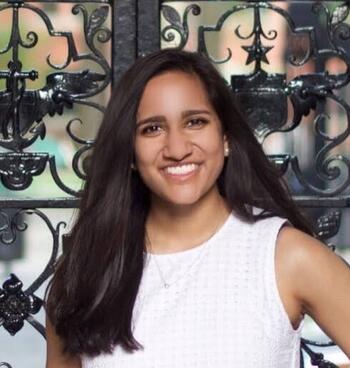Capitalism, Race, and Religion: Former ISPS Fellow Sarah Merchant Explores the Roots of Contemporary Inequalities
In 2016, Sarah Merchant was still a premed student when she walked out of her physics class to join hundreds of students across the campus in protest of police brutality against Black people. She would later change her major to Ethics, Politics, and Economics — a program supported by the Institution for Social and Policy Studies (ISPS) — to study the historical conditions that explained contemporary racialized inequalities.
“By my senior year, I really wanted to think about the relationship between race and class,” she said. “I wanted to understand the sources of the huge wealth gap between Black and white people in America.”
Merchant, Class of ’17, successfully applied to join the ISPS Dahl Research Scholar Program, which provides fellowship support for Yale College students to engage in policy-driven social science research under the guidance of a faculty mentor.
Jacob Hacker, Stanley B. Resor Professor of Political Science and then-director of ISPS, helped Merchant articulate the policy implications of her senior thesis exploring the 2008 United States housing crisis and its effects on the Black-white wealth gap. Merchant distilled her 70-page research paper into a policy brief describing how racial differences in high-cost loans created racial disparities in Connecticut foreclosures. Then, with Hacker’s guidance, she used her work to highlight policy steps that could remedy the issue.
“My economics courses gave me the tools to analyze the world and to produce findings that could eventually influence public discourse,” Merchant said. “Jacob and ISPS helped me to take these skills to the next level by translating my work into something immediately actionable.”
After graduation, Merchant worked as a pre-doctoral fellow for economist Raj Chetty, William A. Ackman Professor of Economics at Harvard University, who uses big data to study the determinants of economic mobility. Merchant dug into the sociological literature on racialized income disparities for a study using 26 years of tax records to document how the persistent income gap between Black and white Americans could be attributed to wage differences between Black and white men. The study found that even when raised in the same neighborhood, white men earned more income than Black men.
The experience led her to pursue the sociological underpinnings of the racial income gap.
“It’s really important to understand how we got here,” she said. “What kind of historical forces shaped these kinds of gaps? It is not enough to say incarceration or housing differences account for the gap in the present. We have to ask what historical forces have produced racial differences in incarceration rates and housing access.”
Merchant spent another year as a research assistant at Harvard Kennedy School before being accepted to the Sociology Department’s Ph.D. program at University of California, Berkeley. She is now in her third year of the program combining her interests in class and capitalism with her interests in race and empire to study social movements in the Global South.
“You can’t really talk about capitalism in the U.S. without talking about slavery,” she said. “And you can’t understand contemporary racial categories without understanding how they are historically and contemporarily undergirded by capitalism. Racial difference and capitalism are co-constructive.”
Merchant’s scholarly interests are in part influenced by her upbringing as the daughter of Indian immigrants.
“My dad might not have moved to the U.S. looking for economic opportunities if India had not been colonized by the British for over 200 years.”
Currently, Merchant is teaching and working on a paper that explores the role of Islam in anti-capitalist organizing in 1970s Pakistan.
“I am looking at how religion — which is often overlooked in academic research — can be a mobilizing force for material action,” she said.
After completing her degree, Merchant hopes to earn an academic position within the humanistic social sciences. And she wants to continue studying anti-capitalist movements to understand how workers can transform their structural conditions.
“Workers have the power to challenge the existing system,” she said. “The labor we do every day produces all value in this system. That’s why we have the power to change it.”
